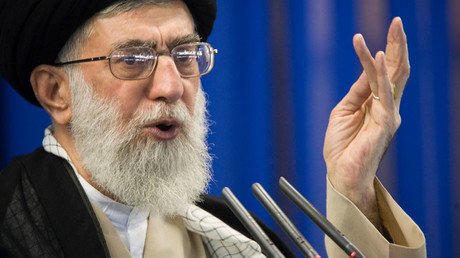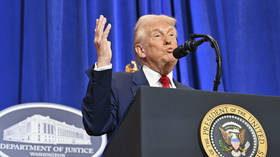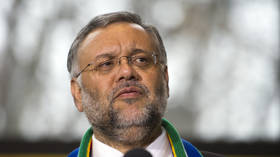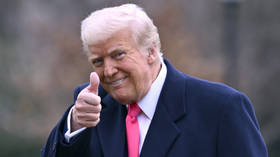‘US is liar, cheater & stabber in the back’: Iranian leader rules out talks with Washington
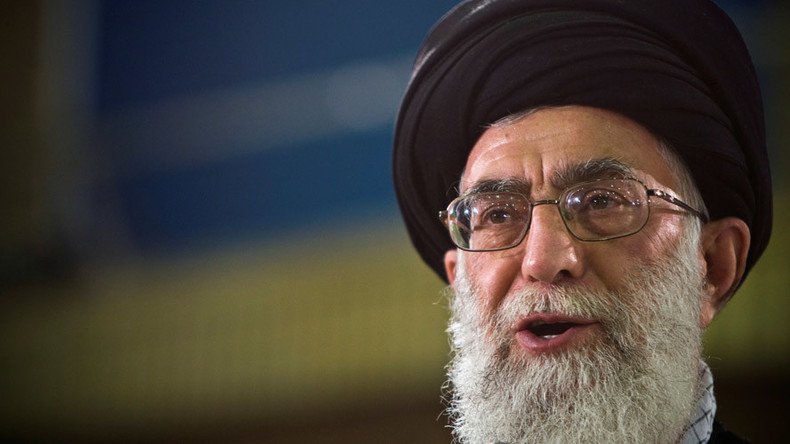
Iran’s supreme leader reiterated his call to mistrust the US, saying talks with Washington would be futile as it is in deep crisis now and cannot solve other nations’ problems. It comes as Tehran marks the anniversary of the US Embassy siege in 1979.
"Negotiations with the US will not resolve our problems, because firstly, it is a liar, disloyal, cheater and stabber in the back, and secondly, the US itself is crisis-stricken – and how can a crisis-hit country resolve another country's problems?" Ayatollah Seyed Ali Khamenei said in Tehran on Wednesday, addressing a large gathering of Iranian school students and teachers.
Thousands of Iranian students met with Leader of Revolution ahead of National Day of Fighting Against Global Arrogance. pic.twitter.com/EcDW72c0XH
— Khamenei.ir (@khamenei_ir) November 2, 2016
The speech was dedicated to Students Day, when Iran marks the beginning of a 444-day hostage situation at the US Embassy in Tehran. On November 4, 1979, amid the Islamic Revolution, Iranian students broke into the diplomatic mission and took 52 American citizens hostage. The anniversary is marked on November 3 this year because the country observes an Islamic calendar.
Khamenei is a known skeptic toward possible rapprochement with the US, regularly criticizing Washington for not delivering on its promises. In his latest speech, he said the tenor of the presidential campaign in America indicated its moral bankruptcy and a general crisis of leadership.
US presidential candidates’ statements in #debates shows collapse of humanitarian values in the United States.
— Khamenei.ir (@khamenei_ir) November 2, 2016
“The policy and essence of the arrogant US government is on the basis of over-ambitiousness and for years it has applied the policy in different parts of the world, particularly in the Western Asia region and pre-revolution Iran,” he said.
“Now the Americans are in a situation that they have become desperate about the developments in Syria, Iraq, Lebanon, Yemen and North Africa. Isn't this situation a crisis?"
Iran and the US have had difficult relations ever since the 1979 revolution in Iran. Under the Obama administration, relations between the two countries somewhat thawed as Tehran and six leading world powers negotiated a deal, under which Iran agreed to restrict its nuclear program in exchange for the lifting of economic sanctions.
The deal was pushed forward by reforming Iranian President Hassan Rouhani, with Supreme Leader Khamenei remaining skeptical, but neutral. The outcome angered hardliners in both countries as well as Iran’s regional adversaries like Israel and Saudi Arabia.
In Iran the effect from the lifting of sanctions is viewed by many as underwhelming, as only those related to the nuclear program were lifted or eased. The US kept in place sanctions relating to Iran’s rocket development, alleged sponsorship of terrorism and other issues.
Khamenei was not the only Iranian official to attack the US on the anniversary of the hostage-taking. Massoumeh Ebtekar, who served as spokesperson for the Iranian students during the 1979 crisis and is now Iran’s vice-president, said the students were justified in their actions because they were convinced that the US was plotting a coup to thwart the revolution.
“They were not militants, radicals. They thought there was an imminent danger... of another coup d’état that would have led to the downfall of the very young and fragile Islamic Revolution,” she told AFP.
In 1953, the US and Britain orchestrated a coup against the government of Iran’s left-leaning Prime Minister Mohammad Mossadeq in response to his nationalization of UK-owned oil assets in the country. The coup installed the pro-US leader Mohammad Reza Shah Pahlavi as the country’s monarch. In 1979, at the height of the Islamic revolution, the Shah fled Iran and an Islamic government took office.
“They installed a government that was a puppet to American policies for 25 years, a tyrant who had imposed dictatorship, very dark ages for Iran,” Ebtekar said.
She also compared the students to the whistleblower organization WikiLeaks, saying they too exposed American classified documents, which they seized along with the embassy.
